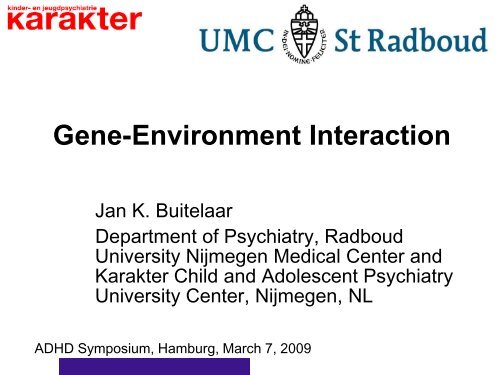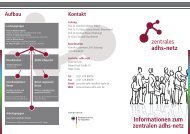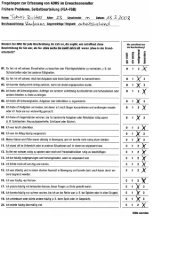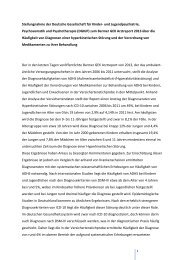Gene-Environment Interaction - Zentrales ADHS Netz
Gene-Environment Interaction - Zentrales ADHS Netz
Gene-Environment Interaction - Zentrales ADHS Netz
- No tags were found...
You also want an ePaper? Increase the reach of your titles
YUMPU automatically turns print PDFs into web optimized ePapers that Google loves.
<strong>Gene</strong>-<strong>Environment</strong> <strong>Interaction</strong>Jan K. BuitelaarDepartment of Psychiatry, RadboudUniversity Nijmegen Medical Center andKarakter Child and Adolescent PsychiatryUniversity Center, Nijmegen, NLADHD Symposium, Hamburg, March 7, 2009
Business Week, 1999
Complicating factors in genetic studies inmultifactorial disorders• Multiple genes of small main effects• The relevant phenotype is unknown• Clinical heterogeneity• <strong>Gene</strong>tic heterogeneity• <strong>Gene</strong>-environment correlation• <strong>Gene</strong>-environment interaction• Importance of developmental factors• Multiple endophenotypesBuitelaar (2005) J Neural Transm Suppl. 69:1-17
<strong>Gene</strong>-<strong>Environment</strong> Interplay• Epigenetic effects of environments on genes• Variations in heritability according to the environment• <strong>Gene</strong>-environment correlations• <strong>Gene</strong>-environment interactionsRutter, Moffitt & Caspi (2006) JCPP, 47, 226-261
GxE and ADHD – current findings• DAT1 and prenatal E risks (alcohol, smoking) (Kahn 2003,Brookes 2006, Neuman 2007) and psychosocial adversity (Laucht,2007)• DRD4 and maternal insensitive behavior (Bakermans-Kranenburg 2006) and paternal warmth (Propper 2007)• SERT and adverse environment (Reif 2007) andsocioeconomic status (Nobile 2007)• COMT and low birth weight (Thapar 2005)
The IMAGE projectMolecular genetic studies
International Study of the Mapping of ADHD <strong>Gene</strong>sIMAGE Data Collection 2003 - 2007• Present study:‣ Focus on prenatal exposure to smoking andGxE and GEr‣ IMAGE subsample with measures of prenatalexposure‣ IMAGE subsample with cognitive measuresAltink et al. (2008a), JCPP; Altink et al (2008b), ECAP, in pressNetherlands, UK, Israel, Ireland, Germany, Spain, Switzerland, Belgium
Prenatal maternal smoking & ADHD• Maternal smoking is an environmental risk factor forADHD, increased risk between 2 and 4 (Linnet al., 2003,Langley et al., 2005)• Increased risk found for• Categorical and dimensional definitions of ADHD• Case-control and cohort studies• Control for genetic factors (twin studies) reduceseffect of smoking considerably
Prenatal maternal smoking & ADHD - Questions• Is this an environmental effect? Or is is geneticallymediated ? Due to GEr ?o What is the effect of paternal smoking?oDoes the transfer of ADHD risk genes explainthe smoking effect ?• Does prenatal smoking also affect cognitiveendophenotypes of ADHD? Is this effect specific forADHD ? Or is it also presence in controls ?• Does prenatal smoking interact with ADHD risk genesin the child in affecting the cognitive endophenotype?
(a)Maternal smokingG parentsAttentional controlPaternal smoking(b)Maternal smokingAttentional controlG childModels of analyses. (a) <strong>Gene</strong>tic mediation hypothesis, where smokingreflects a proxy risk for ADHD genes. (b) <strong>Gene</strong> by <strong>Environment</strong> (GxE) interaction.
Parental smoking• Collected by questionnaire• (1) ‘0 cigarettes’• (2) ‘1-5 cigarettes per day’• (3) ‘6 or more cigarettes aday’
Approach• Sustained Attention Task of the AmsterdamNeuropsychological Tasks (ANT). Duration of the taskwas on average 15 minutes and the target rate was33%.• Sample:ADHD families: 56Controlfamilies: 50ADHDprobands:56ADHD affectedsiblings: 23Non-affectedSiblings: 48Controlchildren: 105In study: 184 children
Percentage maternal and paternal smoking6050403020ADHDnon-ADHD100MothersFathers
Smoking, ADHD / non-ADHD, and attentional performance
Smoking, ADHD / non-ADHD, and attentional performanceADHD main effect,M smoking p=0.7,no interactionADHD main effectP smoking nsSmoking by ADHD interaction
Smoking and parental ADHD risk genesnonsmokingsmokingnonsmokingsmoking% fathers90807060504030201000 1 2 3% mothers90807060504030201000 1 2 3Number of geneticriskfactor in fathersNumber of geneticriskfactors in mothersPercentages of smoking and non-smoking fathers and mothers by thenumber of genetic risk factors (range 0-3): DRD4 7R allele, DAT1 3’UTR10/10, DAT1 INT8 6/6)
Results• Paternal smoking is significantly associated withpresence of ADHD risk genes in fathers• Maternal smoking is not associated with presence ofADHD risk genes in mothers• No indication for GxE interaction effects of prenatalsmoking and ADHD risk genes in the child in affectingattentional controlAltink et al., 2008, ECAP, in press
Interpretation• The paternal smoking effect on attentional controlwas dependent on the child’s ADHD status• The effects of paternal smoking is suggested to begenetically mediated→ Effect of paternal smoking may reflect gene-geneinteraction• The effect of maternal smoking is not suggested to begenetically mediated
Maternal smoking & IQ (Frazier et al., Neuropsychology 2004, 18, 543-555)• Children exposed to prenatal smoking have IQ scores between4 to 15 points lower on standardized tests across different agescompared to their non-exposed peers.• This holds when IQ, educational level or socio-economic classof the parents are controlled for.• A dose-response relation between the amount of cigarettessmoked by the mother and their children’s IQ.• ADHD children have on average a lower IQ than unaffectedchildren→ Does exposure to prenatal smoking contribute to theassociation between ADHD and lower IQ?
Or, is the assocaation ADHD-low IQ due to shared genetic factors?<strong>Gene</strong>tic factors in ADHD & IQ• Heritability estimates:o ADHD: 76%o IQ: 30%-80%• In ADHD familial relationshipverbal IQ (Rommelse et al., 2008)• Association between lower IQand ADHD may be due to sharedgenetic risk factors (Kuntsi et al., 2004)© Karakter | Altink
<strong>Gene</strong>s related to ADHD may affect IQ• DRD4, DAT1• However, several failures toreplicate !Mill et al., 2006, AGP
AimsTo study:1. The effect of maternal smoking during pregnancy on IQ inADHD-affected children and their unaffected siblings in a largesample from the IMAGE study controlling for SES, birthweightand alcohol use.2. Whether polymorphisms in DRD4 (exon 3 VNTR) and SLC6A3(VNTR located in the 3’ untranslated region (3’ UTR)modulated the relationship between maternal smoking, ADHDand IQ.
MethodsUnited KingdomIrelandNetherlandsGermanyBelgiumSwitzerlandSpainIsrael
Methods• 432 families• 397 ADHD affected probands• 119 affected siblings•63 combined subtype•33 inattentive subtype•23 hyperactive-impulsivesubtypeN = 516mean age = 10.9% boys = 80.6• 391 unaffected siblingsN = 195mean age = 10.8% boys = 42.2
Statistical AnalysesLinear Mixed Models (LMM)1. Effect smoking and ADHD on IQo All childreno ADHD and non-affected children2. Effect smoking, ADHD, genotype on IQo All childreno ADHD children onlyCovariates:• Birth weight (grams)• Parental occupational status (3 groups)• Alcohol use during pregnancy (yes/no)• Centre (UK, IRL, NL)• Gender
Effect maternal smoking on IQ, whole groupP < 0.05• Significant main effect of smoking onIQcorrected for: birth weight, parental occupationstatus, centre, maternal alcohol use duringpregnancy• No main gene effects on IQ, and noGxE interaction effects on IQ• Parental educational status strongpredictor for IQIQ1011009998979695949392none 1-5 cig 6 ormoreF(2, 538.01) = 4.19, p = 0.016
Effect maternal smoking on IQ, separately in ADHD and non-ADHD10210098IQ96949290none1 - 5 cig6 or more88ADHDnon-affected siblingsF (2, 363.1) = 4.04, p = 0.018 F (2, 285.1)=0.79, p = 0.451
Conclusion• Our results clearly suggest the possibility thatvariation in prenatal exposure to smoking betweendifferent studies may explain discrepant findings onthe involvement of ADHD risk genes in IQAltink et al. (2008) submitted
















